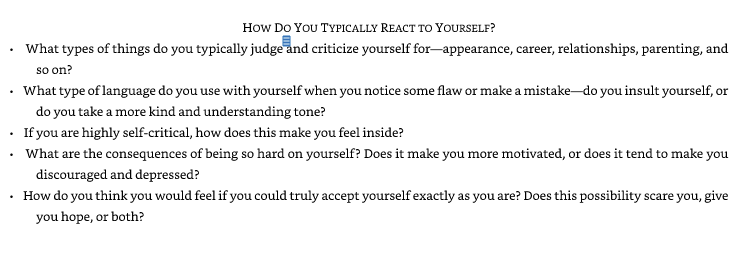Our minds are often full of awful thoughts- what if that noise wasn’t a car back firing? What if our mom was right about us all along? What if we never make it to the top? What if 1-877 KARS4KIDS, K-A-R-S, Kars for Kids? When our unpleasant thoughts take the form of shame and guilt, self-judgment, punishment and inwardly aimed aggression it can start to feel like our self-compassion is failing us. Or perhaps rather that we’re failing our self-compassion, which invites a whole new round of shame and self-criticism. The mindful path to self-compassion doesn’t need us to rip out or delete these thoughts, unpleasant as they may be, but rather to be with them.
The Math of Mindful Self-Compassion-
To notice negative thoughts (awareness), to be present with pain (presence), to accept pain as part of the human condition and to find connection in the suffering of others (common humanity) and to offer ourselves support (loving kindness) where we hurt
(Awareness x Presence= Mindfulness)
(Mindfulness + Common Humanity + Loving Kindness= Compassion)
The following exercise is adapted from Self-Compassion: The Proven Power of Being Kind to Yourself by Kristen Neff and encourages us to be present with the self-inflicted pain of critical thinking.
-
Take a moment at the beginning of your work day or other activity where you are likely to criticize yourself to remind yourself of this practice and to set your intentions to notice and reward yourself for being aware of your self-criticism.
-
Prime yourself to be aware of self-criticism by checking in with yourself about areas of tension, about recent criticism or chronic judgements.
-
Throughout the day as you notice yourself responding to stress with self-criticism reward yourself for noticing by keeping a jar of small candies like skittles or M&Ms nearby. If candy doesn’t feel appropriate offer yourself a hug or even just a kind word to yourself. No one needs to know what you are doing when you fold your arms at your waist or grab a small sweet, but find a way to go out of your way to commemorate the experience.
-
Remember that the more you find yourself being self-critical, the more of your reward you can enjoy. The goal was never to stop yourself from being self-critical (as Marshal Rosenberg says it’s “impossible to do a don’t”) but rather to reward yourself for noticing.
-
What’s more, in some small way, you are offering yourself loving kindness and nurturance in the very moment of your hurt.
-
You may be tempted over the course of the week to expect that your self-criticism and therefore candy consumption may go down. While critiquing yourself less would be a nice outcome, the reality is you are likely cutting back not on judgement but on awareness. If the number of times you notice criticism keeps going up, that’s almost certainly a good thing!
It may seem at first blush that we are merely rewarding ourselves for the behavior we want to change. Instead I’d encourage you to realize that you are rewarding yourself for being mindful, for being aware and present with the part of yourself that is hurting (active verb- causing hurt & passive verb- experiencing hurt). In fact we are not only our own worst enemies but also our own victims and our own best support. Through this practice we remind ourselves that we are the source of our own pain, that we are the recipients of that pain and that we are responsible for soothing that pain. If you are interested in tracking your progress in increasing self-compassion or decreasing self-criticism consider taking this research validated self-assessment.






